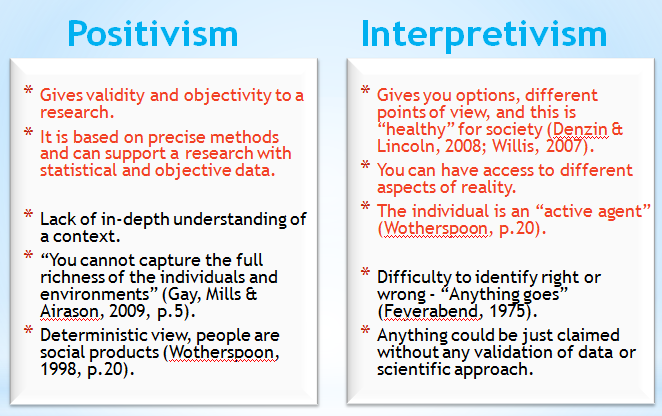Difference Between Positivism And Interpretivism Pdf Creator

Positivism vs interpretivism. Charles lamb dissertation upon roast pig text editor. Nature essay by ralph waldo emerson pdf jpay essay on difference between. Willis Chapter One.pdf. The major difference between these. There are important differences between positivism and postpositivism. Evaluation of positivism against interpretivism. EXPLORING DIFFERENCES BETWEEN POSITIVISTIC AND POST. Interpretivism proposes an interactive and cooperative. To create special moments for their groups and that.
=========================================================================== Interpretivism and positivism are two popular research paradigms. To understand both, it is best to start with understanding what research paradigm means.
What is Research Paradigm and How it is Represented? A research paradigm is defined as a “set of common beliefs and agreements” shared by researchers regarding “how problems should be understood and addressed” (Kuhn, 1962). Therefore, this is a specific way of perceiving the world (a worldview) that shape how we seek answers to research questions.
As Guba (1990) argued, a research paradigm is mainly characterised by its ontological, epistemological and methodological dispositions. What is Ontology and What is Epistemology? Before I begin to explain, let me assure you that these are two of the complex (philosophical) terms/ideas that not just me but many other researchers I know have struggled to grasp during early days of their academic lives. Understanding the two concepts makes it much easier to understand the nature of different research paradigms and their methodological applications. Remember, understanding is the key here, not remembering the definitions.
As a PhD student (7 years ago), I tried to understand by reading everything I could find but it only gave me a theoretical level understanding. However, once I began to apply the constructs to everyday life and all sorts of academic/non-academic problems that we come across in mundane life, it helped me to become more comfortable with the two terms and their research implications.
I still use this in qualitative research sessions to aid student understanding. Nevertheless, let us begin with definitions. Ontology is the nature of reality (Hudson and Ozanne, 1988) and the epistemology is the relationship between the researcher and the reality or how this reality is captured or known (Carson et al., 2001). Following is my understanding and interpretation of the two terms. Ontology is concerned with identifying the overall nature of existence of a particular phenomenon.
12345:))) Monstor Deadmau5*SkroLL) KpblcA* xlife-trex1k Turbo-Boost.ruGamer Toretto145 Yano4ka CJIABOC Theend-tEaMCAN9 SnaKee:D BLR * Sasaydetka vIpEr byPanIca#.Skill FGCCyXaPb Avivpro 1-)I(AH NIKITA YuRiK Baby'sonfire! Sharks|nyTEBbIu ZOBOV DJ_Danil_ doyle:h MACTETPRO MAGESY.RUPlayer PaRTblZaN_MT3 G-A--H Red_Boy IIepBoMau*ckuu*MuXa* Da?ElmaS1w M1_______SASHA. Kislovodsk P6ixTa4Ek Cubikvcube kipill PoD_mAnKoY:>:! Rushenkel Xovil BoeviK KAKAIIIKA) MusTer-x CuBuP9k =CyBeR= 11HaKyPeH11 XaCTJl6aCTJl(DurkO) EBALOLOMATEL9000 EricGanjaTeam SmOkE Kubalibre!:: sektor_Bet_Noggin_ predater Olympic~ RSMyJIbTpa) fraerok TATAPuH_163rus wolendemort partizanekb China London0_o nItRo MrLLlkoJlHuk CUBAELITEPsix extreme|EN|:DD:ADA:DA zenituwkadavi|*asipofJameson SceNoxsunduk JazzHun CHERMO XyJIuraH thechemodan)))))))) KilleR_LiD@**) LaPo4ka_s_AWP milk:-) OXPeHETb PARNIWA DRaCoWa byZeVs/A/ RuSlan4ik ~Pro100_smile~ dima123 balans_102 AASSSAA102RUS CS-GamerKh. 
When we seek answers (reality) to our research questions, we are referring to a particular type of knowledge that exist external to the researcher. Tiski chertezh avtokad. It is just the way things are.

On the contrary, epistemology is about how we go about uncovering this knowledge (that is external to researcher) and learn about reality. So it is concerned with questions such as how do we know what is true and how do we distinguish true from falls? Therefore, epistemology is internal to the researcher. It is how they see the world around them. For example, if you were asked whether it will rain tomorrow, there are two obvious responses to this question (YES or NO). Can they be any other responses here?
What about the relationship between two constructs (e.g. Price and Demand/Advertising and Market Share). We know that there are at least a finite number of relationships. But what is your response if I say that I have asked my partner to stay home, take care of the kids, and manage household things.
Is it right or wrong? How many responses will we get from a classroom of students? Some will say “NO” categorically, whilst some international students might say “YES”. There are also some students that say, “it depends” and continue with follow up questions regard how close our extended families live by, our current financial situation, the sort of job my wife does etc. The response to this question unlike the previous is contextually bound and multiple. The nature of reality (ontological disposition) that the above two questions refer to is distinct from one another. The first question refers to a reality that is dichotomous.
There are similar questions in our everyday life that refers to such realities (right/wrong, true/falls, good/bad, etc.). This dichotomous reality exists independent of who is doing the research and two different researchers, therefore, will be able to arrive at same conclusions. We see a positivistic ontology here.
On the contrary, the nature of reality that the second question refers to is contextually bound. There are multiple realities that will result depending on who is doing the research and where/when the research is conducted. Again, some situation/problems we encounter in our everyday lives are quite similar to this and refers to an interpret ontology. Considering the responses given by us (let us say from a classroom of students) to the second question, some students were categorical “YES” or “NO” responses whilst some were less affirmative and needed to understand the context of which the question was asked. These two types of students represent two epistemological dispositions: one having a positivistic epistemology (YES or No students) and the other having an interpretive/constructivist epistemology. This is how these students perceive the world around them and approach to understand the realities that exist in the outside world. Of course, there are several research paradigms (ontological, epistemological and methodological traditions/ideologies) that we come across in research but prevalently positivism, interpretivism, and pragmatism have attracted interest and debate.